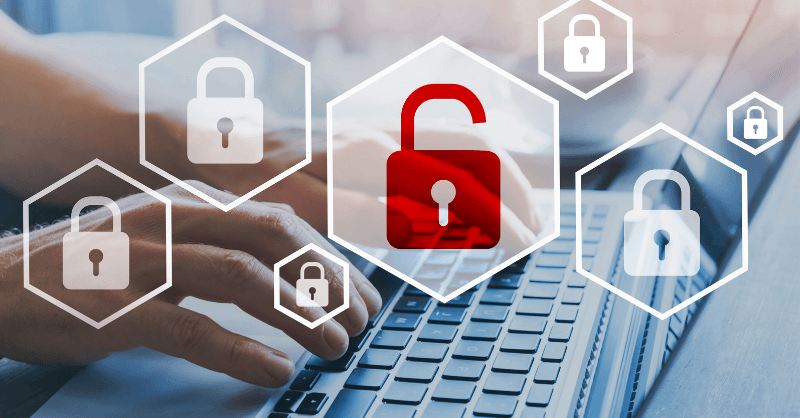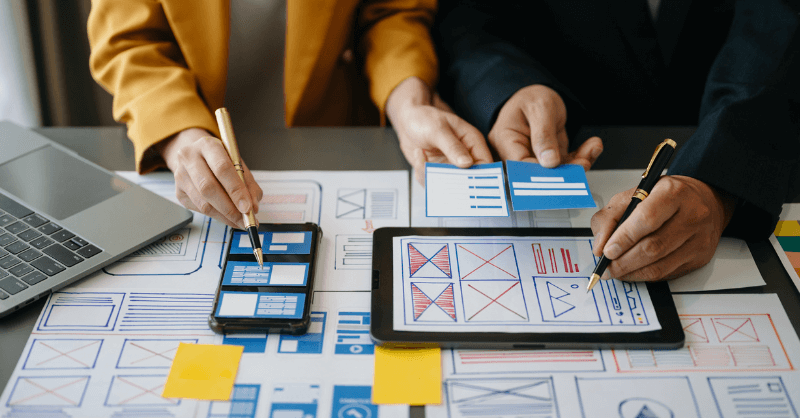A good listener is someone who listens to the speaker to receive and interpret messages accurately. No one likes to communicate with a person who cares only about what they have to say. That’s why, to become a good communicator, you need to be a good listener too. This blog focuses on the importance of listening skills in communication and mentions several ways to improve them.
So, without further ado, let’s get started!
Table of Contents
What are Listening Skills in Communication?
Listening is one of the essential soft skills. It indicates a person’s ability to receive and interpret information in the communication process.
Without active listening skills, you won’t be able to receive and interpret the message. As a result, the communication process will break down, and the speaker can quickly become irritated.
Moreover, listening skills rank among the most critical soft skills to incorporate while crafting your resume. Effective communication is an absolute cornerstone in the professional realm, and active listening serves as its bedrock. By showcasing your expertise in active listening, you underscore your dedication to fostering transparent, cooperative, and influential communication and present yourself as an invaluable asset to any team or organization.
Are You a Good Listener?
You feel good and appreciated it when others listen to what you say, especially in the workplace. But, have you ever thought that if you are a good listener?
To find out if you are a good listener or not, answer the below questions. Check if you do the following:
- Often interrupt others when they’re talking
- Talk when others are talking
- Jump to conclusions long before the speaker is finished talking
- Often ask people to repeat themselves
- Let your feeling towards the speaker come between your listening ability.
If you answered “YES” to one or more of these above questions, you might need to improve your listening skills.
Importance of Listening Skills in Communication
Listening skills are a vital part of good communication. If you have good communication skills, you can start to improve relationships in the workplace as well as in society. Also, you will be able to make decisions more effectively and reach a quicker agreement with others. Here are 7 reasons why listening skills are essential:

1. Reduces Misunderstandings
Poor communication always results in misunderstandings. And, poor communication arises from poor listening skills. People end up assuming things and misunderstanding each other if they do not share their side of the stories or listen to others actively. So, it’s easy to mishear something or misinterpret information. Such misunderstanding can gradually keep increasing if the listening skills in communication are not improved.
2. Builds Empathy
Empathy is essential to effective listening. Therefore, it would be best if you mirrored the emotions the speaker has. For example, if the speaker’s face expresses sadness or joy, your facial expressions and words should also express similar emotions. Empathy towards the speaker takes concentration and consumes energy, allowing open communication and establishing relationships.

3. Limits Judgements
Listening limits judgements. While actively listening to someone, your total concentration stays in the conversation. As a result, you try your best to understand the other person or group of people and remove judgmental thoughts. You, therefore, listen to the speaker with an open mind because they are giving you their perspective. You may realise that the speech makes more sense as they continue the lecture.
4. Improves Business Relationships
If you are working in a customer-centric or interactive role, your communication skills play a big part in your success. Thus, practising good listening skills with everyone at the workplace would benefit your success. You could also build stronger bonds with your co-workers. As a result, everyone will respect you more and value you.

5. Increases Productivity
Whether you’re at work or home, listening is essential to your success. Good listeners are more likely to store information and understand what’s being required of them. This is a valuable skill in group projects and meetings. People may think they need to talk a lot to contribute, but listening is arguably more essential. If everyone listens to each other, there is less room for misunderstandings. This increases everyone’s productivity.
6. Enhances Leadership Skills
Leaders always have good listening skills in communication. Active listening helps you connect with your team’s ideas, hear various perspectives, and prevent miscommunications. In addition, a good team leader ensures everyone feels respected, which means they all feel listened to. They always listen to others and help them in every possible way.
7. Providing Feedback
Providing feedback to the speaker can only be achieved through active listening. The goal of feedback is to send signals to the speaker to know that you are actively listening. The medium of feedback can be verbal or non-verbal.
For example, you can use “okay, or I understand it” for verbal feedback. And for non-verbal feedback, you can nod your head and other appropriate facial expressions. Writing down what the speaker is saying also shows your attentiveness.
8. Enhancing Communication Skills Through Specialised Learning
Communication is the cornerstone of human interaction, and possessing strong communication skills is crucial for success in both personal and professional spheres. Aspiring professionals in sales, negotiation, and management roles can benefit from tailored guidance provided by skilled tutors. To explore how Superprof fosters superior communication abilities, you can delve into their blog post on payments and Charges on Superprof. This platform empowers individuals to develop crucial communication skills, amplifying their prospects in today’s competitive job market.
Which Jobs Require Good Listening Skills?
Listening skills are essential for good communication. Every professional and non-professional person should master this skill. Listening skills are vital for every job, but they are more critical than other soft skills in business. Below is the list of roles where listening skills are essential.
- Sales
- Negotiation
- Coaching
- Mentoring
- Interviewing
- Managing
How to Improve Your Listening Skills in Communication?
It is very crucial that you evaluate your listening skills to select the areas that require improvement. Here are some ways you can follow to help improve your listening skills:
1. Maintain Eye Contact With the Speaker
In a meeting or public speaking, you should always maintain eye contact with the speaker. By doing this, you are giving your undivided attention to the speaker. Also, it shows that you are making an effort to understand what they are saying. As a result, the speaker will feel they are being appreciated for their effort.
Also, it gives them a non-verbal indication that you are interested in what they are saying, which encourages them to continue expressing themselves. So, you should limit any unnecessary distractions in meetings and public speaking. For example, you should avoid:
- Texting or scrolling through your phone,
- Looking out a window,
- Scanning a computer screen
- Body language such as biting your finger, running your finger into your hair, etc.
Sometimes, the speaker won’t make eye contact with the audience. This is because they are maybe shy or feel uncertain. Or that people in their culture do not use direct eye contact when communicating. However, you should continue to face the speaker even if they don’t look at you.
Related: How to Tell Someone to Improve Their Communication Skills?
2. Visualise What the Speaker is Saying
Visualising something related to the topic when listening to it is a great way to memorise it. If you do this while listening to the speaker, you will remember keywords and phrases quickly. Therefore, you should try to conjure up mental images while you are listening to the speaker.
To make up a mental image, you can use simple pictures or places related to the topic. Although, if you lose focus when visualising something, make sure that you immediately refocus on the topic.
3. Do Not Interrupt
Everyone’s capacity to understand a subject is different. For example, in some matters, you may not understand everything that someone says to you. So, you may want to ask a question to back up and clarify the topic or phrase you misunderstood.

However, you should wait for a pause in their speech and then ask your question. This way, you are showing the speaker that you are listening, paying attention and willing to discuss things further. The speaker will also appreciate it because they can finish the speech without interrupting.
4. Pay Attention to Non-Verbal Cues
Most of the time, our communication medium is non-verbal. Our body language and voice tone often give out what we are feeling even without saying anything. You can detect if the speaker is bored, irritated, or enthusiastic by just looking at their eyes, mouth, and shoulders position.

You should follow others’ body language as well as listen to the speech. It will help you understand what the speaker actually means when they are talking to you. If you do not know the Non-Verbal Cues then have a course of British Sign Language from One Education.
5. Practice listening
Practising is a great way to improve and learn any skill—listening means being aware of what to do when someone is talking to you. So you can improve your listening skills by practising. For example, you should write down what you heard, understood and give feedback to the speaker.
Also, you can listen to podcasts or audiobooks; they are great for improving listening skills. Although, you should not listen to more than a four-minute clip. Write down what you understand and replay the audio clip to see how much information you had retained from the audio.
Many professional bodies such as One Education can help you learn new skills.
6. Work With An Expert Study Skills Tutor
Listening skills are crucial in both academic and professional settings, as they facilitate effective communication and understanding. By actively listening, individuals can absorb information more accurately, engage in meaningful discussions, and build stronger relationships. Working with a study skills tutor can be immensely beneficial for enhancing listening skills. Tutors provide personalized guidance and exercises that focus on active listening techniques, such as note-taking strategies, summarizing key points, and asking relevant questions. These targeted interventions help students develop sharper listening abilities, enabling them to grasp complex concepts, follow instructions meticulously, and excel in their educational pursuits.
7. Revamp Your Resume:
You know you’re in dire need of a resume makeover when your current one looks like it was typed by a caffeinated monkey. Let’s face it. Not everyone has the knack for crafting a professional resume that stands out in the corporate jungle. That’s where the finest resume writing services come to the rescue.
Having a well-structured resume is like having a secret weapon in your job search arsenal. It’s the Swiss army knife of self-promotion, showcasing your skills and accomplishments in a way that leaves hiring managers wanting to know more about you. Trust us; you want them to feel like they’ve stumbled upon the holy grail of job applicants when they read your resume.
So, let the experts work their magic. These resume gurus have mastered the art of sprinkling the right keywords, tailoring your achievements, and making your work history look like a masterpiece. They know how to highlight your strengths.
With a top-notch resume in hand, you’ll be ready to face any job interview with confidence. Remember, the competition out there is fierce, like a game of corporate hunger games. But with a professionally crafted resume, you’ll be the Katniss Everdeen of job hunting – skilled, resourceful, and ready to take on any challenge.
Why settle for a basic resume when you can have a show-stopping, career-catapulting masterpiece? It’s time to make the corporate world sit up and take notice.
Closing Not on Importance of Listening Skills in Communication
Having effective importance of listening skills in communication means expressing interest in the topic being discussed and understanding the information provided. Good listening skills are very vital for in or out of the workplace. Often people with good listening skills are promoted or get to work on a project they like.
The benefits of listening skills in communication are enormous in the workplace. Employees with good listening skills ensure better workplace relationships, increase productivity and more. To become a good listener, you first identify why you have poor listening skills. After that, work on your flaws.
FAQs
1 . Why is it important to listen in a conversation?
Listening in a conversation is important because it helps you understand others better and respond appropriately. When you actively listen, you show respect and interest in what the other person is saying, which strengthens relationships and fosters effective communication. Additionally, listening allows you to gather important information, avoid misunderstandings, and make informed decisions.
2. Why is listening often considered the most crucial aspect of effective communication?
Listening is seen as the most important part of effective communication because it helps people understand each other better. When we truly listen, we show respect and empathy, making others feel valued. This improves relationships and collaboration, leading to better problem-solving and fewer misunderstandings. Ultimately, good listening builds trust and strengthens communication overall.
3. What is the importance of listening while speaking with clients?
Listening to clients is super important because it helps you understand what they want and need. When you really pay attention, you can make them feel heard and cared for. This builds trust and makes them happy, which is great for your business.
4. Why is effective listening important in communication?
Effective listening is considered important in communication because it allows messages to be understood accurately, fosters mutual respect between individuals, and enhances the quality of relationships. It enables ideas to be exchanged more clearly and facilitates problem-solving. Additionally, when individuals feel listened to, they are more likely to feel valued and engaged in the communication process.
5. What is the 10 importance of listening?
The ten importance of listening skills in communication are: understanding others’ perspectives, building trust, resolving conflicts, improving relationships, enhancing productivity, fostering empathy, gaining knowledge, showing respect, avoiding misunderstandings, and making better decisions.
6. what are the essential of a good listener? what is the importance of listening ability in business communication?
The essentials of a good listener include being attentive, empathetic, and nonjudgmental. Importance is placed on the ability to listen actively in business communication as it fosters understanding, builds trust, and promotes effective collaboration among team members.
7. why are skills important in english communication. discuss in detail with reference to the important listening and writing skills.
Skills in English communication are deemed important due to their ability to enhance understanding and convey messages effectively. Listening skills allow individuals to comprehend information accurately, fostering better communication and collaboration. Additionally, writing skills enable clear expression of ideas and facilitate effective communication across various platforms. These skills are essential for effective communication in English, ensuring clarity and coherence in interactions.
Further resources
- Communication And Interpersonal Skills in Food And Beverage Service
- The Importance of Effective Communication in Healthcare
- Effective Communication Skills For Social Workers
- 20 Great Jobs to Consider if you have Good Communication Skills
-
Why is Communication Skills of Physicians Important for Patients' Satisfaction?
-
How to Improve Your Interpersonal Communication Skills
- How Do People Develop Cross Cultural Communication Skills?
- Marriage Advice: The 8 Communication Skills of Happy couple
- 10 Essential Communication Skills for Workplace
- 10 Best Assertive Communication Worksheets and Techniques
- How to Tell Someone to Improve Their Communication Skills?
- 20+ Effective Communication Skills (Good for a Resume)
-
Different Types Of Communication: Everything You Need To Know
- A Definitive Guide To Basic Interpersonal Communication Skills
- The Importance of Listening Skills in Communication







 January 08, 2024
January 08, 2024








